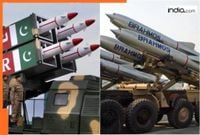Pakistan has issued a stark warning of imminent military confrontation with India, claiming it has credible intelligence indicating that India plans to launch an attack within the next few days. This alarming declaration comes in the wake of escalating tensions following a deadly assault in Indian-controlled Kashmir that left 26 people dead, most of whom were Indian tourists. The Pakistani government has vowed to respond "very strongly" if provoked, as cross-border skirmishes continue along the Line of Control (LoC).
The situation intensified on April 30, 2025, when Pakistan's military officials stated that the intelligence suggested India would initiate military action against Pakistan in the next 24 to 36 hours, citing "baseless and concocted allegations" of Pakistani involvement in the Kashmir attack. The attack, which occurred in Pahalgam, was claimed by a previously unknown militant group, Kashmir Resistance, which has been characterized by Indian authorities as a proxy for Pakistan-backed terrorism.
In response to the attack, Indian Prime Minister Narendra Modi has reportedly granted complete operational freedom to the armed forces to determine the timing and nature of India’s response. Modi's administration has made it clear that the massacre of innocent tourists will not go unpunished, prompting Pakistan to scramble its military and diplomatic resources in anticipation of possible retaliation.
On the diplomatic front, United Nations Secretary-General Antonio Guterres has called for both nations to avoid confrontation, emphasizing the potential for tragic consequences. U.S. Secretary of State Marco Rubio also reached out to Pakistani Prime Minister Shehbaz Sharif, stressing the importance of peace and stability in South Asia.
Amidst these developments, Pakistan's Foreign Minister Ishaq Dar reassured the public that Pakistan would not be the first to escalate tensions, but he warned that any aggressive move by India would elicit a strong response. "If they think that aggression is the path forward, our message is only this: We are ready, don’t test it," said Lt. Gen. Ahmad Sharif, Pakistan's army spokesman.
The deadline for Pakistani citizens to leave India, following New Delhi’s directive, passed on April 27, 2025. Many families were still attempting to cross the border at the Attari-Wagah crossing, with reports of individuals being deported by Indian authorities. Sara Khan, a Pakistani national, expressed her distress as she prepared to leave India without her Indian husband, stating, "We have settled our families here. We request the government not to uproot our families."
India’s response to the attack has included the suspension of a crucial water-sharing treaty with Pakistan and the closure of its airspace to all Pakistani aircraft until May 23, 2025. In retaliation, Pakistan has closed its airspace to Indian airlines, escalating the tit-for-tat measures between the two nations.
On the military front, both sides have accused each other of initiating gunfire along the LoC. Reports indicate that Pakistan's army engaged in unprovoked firing, leading to retaliatory measures by Indian forces. The Indian army reported responding to what it termed "unprovoked" small arms fire from Pakistan in various sectors of Indian-controlled Kashmir.
Witnesses to the Pahalgam attack described harrowing scenes as gunmen targeted Hindu men specifically, with Aishanya Dwivedi recounting how her husband was shot after he identified himself as Hindu. "He was on my lap. I was soaked in his blood," she recounted, highlighting the brutality of the attack.
As the situation continues to unfold, Pakistan's military and civilian leadership are reportedly in a state of heightened alert. Information Minister Attaullah Tarar has characterized the atmosphere in Pakistan as one of panic, noting that the country has intensified its military preparedness along the LoC. Pakistan is repositioning radar systems and deploying electronic warfare units to monitor Indian movements, reflecting fears of potential airstrikes.
In the aftermath of the Pahalgam attack, Pakistan has also begun relocating terrorists from launch pads across Pakistan-occupied Kashmir to more secure locations, indicating a significant shift in its military posture. This move follows the identification of these launch pads by Indian security agencies, prompting concerns about future militant operations.
Pakistan's diplomatic efforts have included reaching out to allies and seeking support for a neutral investigation into the Pahalgam attack. However, reactions from international partners have been mixed, with only China expressing support for Islamabad's call for an impartial probe. The U.S. has publicly backed India, urging both nations to pursue a responsible resolution to the crisis.
As the threat of military action looms, the international community watches closely, with fears that any miscalculation could escalate into a broader conflict. The situation remains tense, with both nations on high alert as they navigate this precarious moment in their fraught relationship.
In summary, the recent escalation in tensions between India and Pakistan has raised alarms globally, with both nations preparing for potential military confrontations. As diplomatic efforts continue, the hope remains that dialogue can prevail over aggression, preventing further loss of life and fostering stability in the region.


